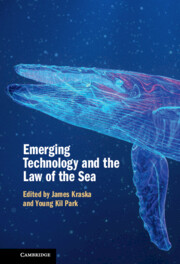Book contents
- Emerging Technology and the Law of the Sea
- Emerging Technology and the Law of the Sea
- Copyright page
- Contents
- Contributors
- Preface
- 1 Emerging Technology and Maritime Boundary Dispute Resolution
- 2 Renewable Energy and the Law of the Sea
- 3 Striking an Equitable Balance under the Biodiversity Agreement
- 4 Small Modular Reactors and Transportable Nuclear Power Plants
- 5 Shipping, Distributed Ledgers and Private Maritime Law
- 6 Maritime Cyber Security
- 7 International Standards for Hull Inspection and Maintenance of Robotics and Autonomous Systems
- 8 Functionalism and Maritime Autonomous Surface Ships
- 9 Artificial Intelligence to Facilitate Safe Navigation of Ships
- 10 Unmanned and Autonomous Warships and Military Aircraft
- 11 Seabed Technology and Naval Operations on the Continental Shelf
- Index
7 - International Standards for Hull Inspection and Maintenance of Robotics and Autonomous Systems
Published online by Cambridge University Press: 07 July 2022
- Emerging Technology and the Law of the Sea
- Emerging Technology and the Law of the Sea
- Copyright page
- Contents
- Contributors
- Preface
- 1 Emerging Technology and Maritime Boundary Dispute Resolution
- 2 Renewable Energy and the Law of the Sea
- 3 Striking an Equitable Balance under the Biodiversity Agreement
- 4 Small Modular Reactors and Transportable Nuclear Power Plants
- 5 Shipping, Distributed Ledgers and Private Maritime Law
- 6 Maritime Cyber Security
- 7 International Standards for Hull Inspection and Maintenance of Robotics and Autonomous Systems
- 8 Functionalism and Maritime Autonomous Surface Ships
- 9 Artificial Intelligence to Facilitate Safe Navigation of Ships
- 10 Unmanned and Autonomous Warships and Military Aircraft
- 11 Seabed Technology and Naval Operations on the Continental Shelf
- Index
Summary
Hull inspection in the operational routine of commercial shipping is a regulatory obligation. This ensures seamless and smooth operations of commercial shipping vital to the global economy and the international supply chain. Failure to carry out these tasks may result in adverse consequences for the industry, leading to poor maintenance, poor performance and increased fuel consumption. In this era of digital advancement, service robots are integrated into the rudimentary manual inspection system. The systems are based on machine learning and capable of interacting with the environment to achieve preset goals and offer affordable and efficient alternatives. These advanced artificial intelligence–based alternatives are set to change the entire survey and maintenance landscape. While technological advancements continue, the regulatory governance side to these alternative technological solutions is gathering momentum and calls for a state-of-the-art analysis in light of the standardized requirements at play under the existing international regime.
Keywords
- Type
- Chapter
- Information
- Emerging Technology and the Law of the Sea , pp. 184 - 213Publisher: Cambridge University PressPrint publication year: 2022

